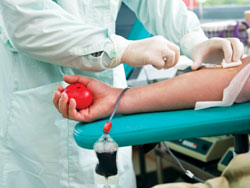CJBC Software Update Was Delayed Due to Potential Merger
 More than two years after the U.S. Food and Drug Administration’s (FDA) guidelines were changed to become more welcoming towards lesbian, gay, bisexual, transgender, and queer (LGBTQ+) donors, particularly gay men, the Central Jersey Blood Center (CJBC) has not updated their systems to allow for such donations, leading to the denial of a Monmouth University student during their on-campus blood drive on April 2.
More than two years after the U.S. Food and Drug Administration’s (FDA) guidelines were changed to become more welcoming towards lesbian, gay, bisexual, transgender, and queer (LGBTQ+) donors, particularly gay men, the Central Jersey Blood Center (CJBC) has not updated their systems to allow for such donations, leading to the denial of a Monmouth University student during their on-campus blood drive on April 2.
In 1983, a ban on blood donations on who the FDA and Red Cross refer to as “men who have sex with men (MSM)” was enacted, indefinitely banning men who had had a same-sex encounter due to concerns surrounding the spread of the HIV/AIDS epidemic. On December 21, 2015, the guidelines were changed to instead only require MSM donors to have been celibate for one year rather than their entire life. According to the Red Cross, “All U.S. blood collection organizations must follow this federal requirement.”
However, according to a University student who wishes to remain anonymous and attempted to participate in the blood drive on campus, he was not allowed to donate despite meeting current criteria because CJBC has not updated their system to reflect the new guidelines.
According to the student he went to the blood drive and filled out the pre-donation questionnaire where he found the outdated question, which asks if the donor has had sexual encounters with a male from 1977 to the current year. He answered yes, since his most recent such encounter had been approximately two years ago, within the eligibility standard for current guidelines.
A staff member at the blood drive reviewed his answers and asked when the encounter was; after explaining the time frame of events, the staff member went to ask another organizer and then returned saying he was ineligible to donate.
“I really wanted to donate blood and am extremely disappointed at being turned down due to my sexual partners,” said the student, who is O- and said that he chose to donate because he found that he was eligible due to the current guidelines. O- is a universal blood type which can be given to all people and is the rarest to find, making donations of it valuable, according to the Red Cross. The student also said that he had been tested for HIV on campus approximately a year before.
“It has to do with computer systems, software upgrades, and the ability to manage old and new blood donor questionnaires and eligibility criteria while remaining in compliance with all FDA requirements,” said Kip Kuttner, the CJBC Medical Director. “CJBC is in the middle of a software upgrade that will bring it into compliance with the latest eligibility criteria.”
According to Kuttner, the upgrade was planned but delayed due to circumstances, and the upgrade is currently planned to be complete by the end of December 2018, approximately three years after the guidelines were issued.
Pascal George, the CEO of CJBC, explained the circumstances further. “The story is complicated by the fact that our industry is undergoing tremendous changes right now,” said George, who also said that the FDA guidelines were changed less than two years ago.
According to George, the field has gone from an environment where there was never enough blood to which there was a “nationwide overcapacity.” He explained that this doesn’t mean that there is too much blood, but instead means that blood centers such as CJBC have been faced with financial pressures from hospitals trying to save money and squeeze their suppliers, leading to a trend of consolidation within the field.
Originally, CJBC was one of four blood centers in the state, but as of last year they are the last community/local blood center that has not gone bankrupt or been acquired by another blood center, according to George.
“For the last two years we’ve been in serious discussions with the national company,” said George. “Decisions about substantial investments have been deferred because we thought we were going to merge.” One of those delayed investments was the changing and upgrading of computer systems to reflect current FDA guidelines. However, since CJBC is no longer considering a merger, they will be updating the guidelines for the end of the year.
“We have to adopt a new donor questionnaire, change the format in computers which would then need to be validated to make sure it follows FDA rules,” George continued. “We have a very antiquated information system. We are starting the upgrade this April. We would have done it two years ago if we didn’t think that we were merging because when you merge you have to adopt the process. It is a process that takes about nine months, and takes a lot of work.”
“To have blood banks that are not keeping up with federal regulations is concerning to say the least, and when we have such a history of discrimination against LGBTQ+ folks overall and the history of stigmatization around HIV and AIDS, I do think that this can certainly trigger feelings of humiliation and othering, and would prevent people from wanting to donate,” said Johanna Foster, Director of the Sociology Program on campus and an assistant professor of sociology.
“The practice of banning gay blood-donors is nonsensical, outdated, and discriminatory,” said Kayvon Paul, Community Outreach Coordinator for Garden State Equality (GSE), New Jersey’s largest civil rights organization, located in Asbury Park. “Policies like this only encourage a negative stigma of the LGBTQ community that we fight so hard to eradicate. Additionally, these guidelines are detrimental to the potential recipients of blood donations that are being lost because of this antiquated practice.
“Something like this does perpetuate this invisible and lethal stigma which frames the perception of how gay men, and the rest of the LGBTQ+ community are continously portrayed in society,” said Jane Lai, President of Sexuality, Pride, Education, Community, Truth, and Unity at Monmouth (S.P.E.C.T.R.U.M).
According to George, he does not believe that many LGTBQ+ or MSM donors were deferred due to the out-of-date software. “We don’t really know how many donors we are losing – the assumption is not really a number,” George said. “How many people are going to have a lifestyle where they have sexual encounters less than once per year? We don’t think, from the point of missing donors, that it’s a very significant number. From the social policy point of view, it’s very significant that we are only halfway there.”
“I want to assure you that it is not a reflection of any kind of judgement on any kind of lifestyle at this time,” George continued. “It’s pure logistics and conditions that have prevented us from being able to make the change.”
The CJBC blood drives on campus are sponsored by the School of Science, the School of Social Work, and the School of Nursing and Health Studies, according to Steven Bachrach, Ph.D., Dean of the School of Science and chemistry professor. According to Bachrach, the blood drives began in the fall of 2014.
IMAGE TAKEN from patch.com


